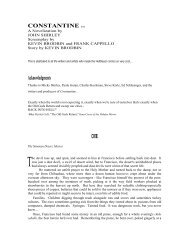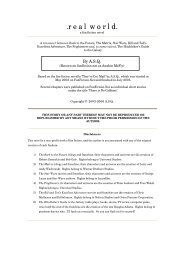Queer Keanu: Race, Sexuality and the Politics of - Whoa is (Not) Me
Queer Keanu: Race, Sexuality and the Politics of - Whoa is (Not) Me
Queer Keanu: Race, Sexuality and the Politics of - Whoa is (Not) Me
Create successful ePaper yourself
Turn your PDF publications into a flip-book with our unique Google optimized e-Paper software.
closet.” 3 The new policy was instituted in <strong>the</strong> wake <strong>of</strong> <strong>the</strong> increasing v<strong>is</strong>ibility <strong>and</strong><br />
political clout <strong>of</strong> queer activ<strong>is</strong>ts; although, ultimately, <strong>the</strong>y were not powerful enough to<br />
reform <strong>the</strong> military. The comprom<strong>is</strong>e measure came into effect in 1993, <strong>the</strong> year before<br />
Reeves broke through as an Al<strong>is</strong>t actor with <strong>the</strong> film Speed, <strong>and</strong> when rumors <strong>of</strong> Reeves<br />
marriage to Geffen started to spread. The policy was <strong>and</strong> <strong>is</strong> largely ineffective in<br />
protecting gay, lesbian <strong>and</strong> b<strong>is</strong>exual soldiers, but it <strong>is</strong> still significant for <strong>the</strong> way it both<br />
reflects <strong>and</strong> produces a particular, postStonewall, underst<strong>and</strong>ing <strong>of</strong> homosexuality <strong>and</strong><br />
identity. Prior to “Don’t ask, don’t tell” military policy tended to focus on homosexual<br />
acts as bas<strong>is</strong> for explusion. In fact, a soldier could claim to be homosexual or “come out<br />
<strong>of</strong> <strong>the</strong> closet” but could remain in <strong>the</strong> military if “<strong>the</strong>re <strong>is</strong> fur<strong>the</strong>r finding that <strong>the</strong> member<br />
<strong>is</strong> not homosexual or b<strong>is</strong>exual.” Under <strong>the</strong> new policy, <strong>the</strong> assertion <strong>of</strong> a gay, lesbian or<br />
b<strong>is</strong>exual identity <strong>is</strong> targeted as <strong>the</strong> main threat. While sexual contact with members <strong>of</strong> <strong>the</strong><br />
same sex <strong>is</strong> still considered grounds for admin<strong>is</strong>trative action, <strong>the</strong> new policy <strong>is</strong> notable<br />
for its emphas<strong>is</strong> on speaking. In <strong>the</strong> act <strong>of</strong> telling, <strong>of</strong> verbally claiming an identity, <strong>the</strong><br />
soldier becomes a subject under military law.<br />
PostStonewall, <strong>the</strong> act <strong>of</strong> coming out gained political momentum as both a play<br />
for acceptability through ubiquity (“We’re queer <strong>and</strong> we’re here”) <strong>and</strong> as a move towards<br />
a collective identity. 4 Following in <strong>the</strong> footsteps <strong>of</strong> earlier civil rights movements, <strong>the</strong><br />
Gay Pride movement emphasized <strong>the</strong> positive claiming <strong>of</strong> a “deviant” sexuality. Much<br />
like <strong>the</strong> “Black <strong>is</strong> Beautiful” slogans <strong>of</strong> <strong>the</strong> late 1960’s <strong>and</strong> 70’s coming out did not only













